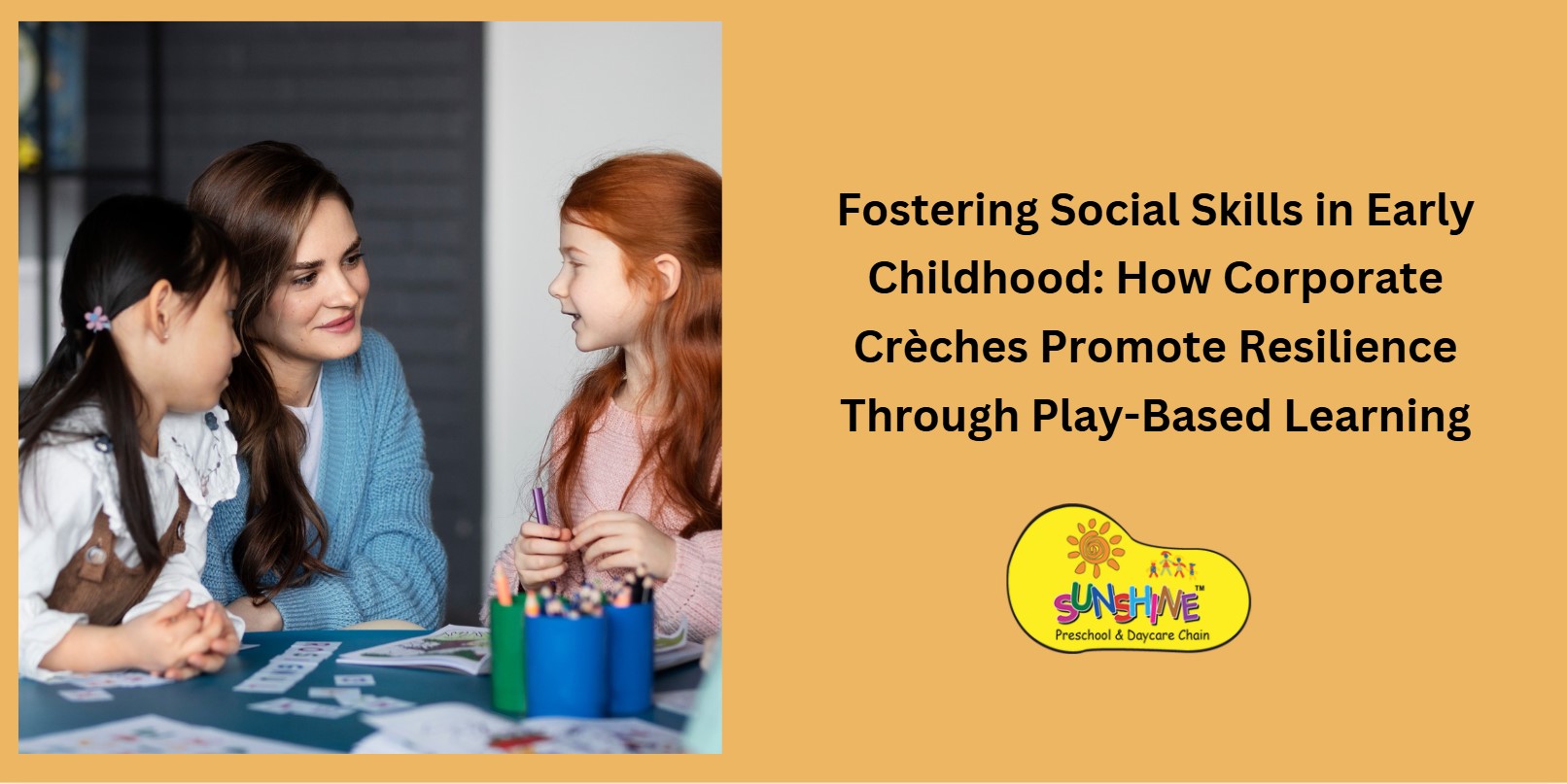Fostering Social Skills in Early Childhood: How Corporate Crèches Promote Resilience Through Play-Based Learning

"Corporate crèches do more than just provide daycare; they lay the groundwork for essential social skills and resilience that will serve your child for a lifetime." The early childhood years are a time of rapid growth, both physically and emotionally. During this time, children learn critical life skills, especially how to manage their emotions, navigate social interactions, and face challenges. For working parents, choosing the right childcare option is essential to ensure that their child is not only safe but is also thriving in a supportive environment that fosters both social skills and resilience.
This blog will explore the importance of early childhood development and how corporate crèches contribute to promoting resilience through play-based learning, ultimately shaping children into well-adjusted, capable individuals.
The Importance of Early Childhood Development in Building Resilience
Early childhood development (ECD) refers to the physical, cognitive, emotional, and social growth that occurs during the first five years of life, a period considered the most critical for a child’s brain development. Research consistently shows that the first few years lay the foundation for later learning and success, influencing everything from academic achievement to social behaviour and mental health.
In India, early childhood development (ECD) is gaining increasing attention as a key investment for the country’s future. The National Early Childhood Care and Education (ECCE) Policy, adopted in 2013, emphasised the importance of early childhood education and care in shaping a child's ability to succeed academically and emotionally. In fact, studies from UNICEF and the Indian Early Childhood Education Impact Study (IECEI) show that children who attend high-quality early education programs are more likely to have higher learning levels and experience greater success in primary school, reducing the likelihood of dropout and repetition.
For India to meet its National Education Policy 2020 goal of ensuring universal access to quality ECE by 2030, it is vital that both public and private sectors, including employers, support accessible childcare services like corporate crèches. These services contribute to school readiness by providing quality early childhood learning that sets the foundation for academic and emotional success.
How Resilience Develops in Early Years
Resilience in early childhood refers to the ability to recover from setbacks, manage stress effectively, and adapt to change. This is particularly crucial for navigating the challenges life throws at us. Resilience is built in the early years through the development of emotional regulation, the ability to solve problems independently, and the experience of overcoming obstacles.
In India, research shows that inadequate childcare disproportionately affects working mothers. According to the Time Use Survey 2024, Indian women spend an average of 341 minutes per day on unpaid caregiving and domestic tasks, nearly 5.9 times more than men. This unequal division of caregiving leads to significant stress and limits women’s workforce participation. Corporate crèches provide an effective solution to this issue, helping parents reduce stress and allowing children to develop social resilience and emotional strength in a structured environment.
By offering on-site childcare, companies can give parents the peace of mind that their children are in a supportive, educational environment while they focus on their professional responsibilities. This not only boosts the resilience of both parents and children but also enhances workplace productivity.
The Role of Corporate Crèches in Supporting Early Childhood Development
Corporate crèches have become increasingly popular for working parents, offering advantages that traditional daycare services may not. Located within or near the workplace, they reduce parental stress and strengthen family bonds.
The benefits extend beyond convenience. In India, the Maternity Benefit (Amendment) Act, 2017 mandates that companies with 50 or more employees provide crèche facilities, though compliance remains low: 75% of organisations fail to implement this mandate. Providing these services is not only a legal obligation but also a business imperative. For instance, a World Bank study has shown that childcare support increases productivity, improves employee retention, and boosts morale, benefiting employers and employees alike.
Corporate crèches provide structure, ensuring that children benefit from early learning, while also allowing working parents to maintain a healthy work-life balance.
Work-Life Balance for Parents
One of the significant challenges for working parents is finding a balance between professional responsibilities and family needs. Corporate crèches offer a solution by allowing parents to focus on their work while knowing their child is in a secure, supportive environment.
These crèches foster a healthy work-life balance, giving parents peace of mind, knowing that their child’s emotional and developmental needs are being met. At the same time, they focus on their professional tasks. Parents can easily drop off and pick up their children from the crèche, allowing for more quality family time and reducing the stress associated with managing multiple responsibilities.
Play-Based Learning and Its Role in Building Social Skills and Resilience
Play-based learning is a method in which children learn through structured play and interactions with peers, helping them understand the world around them. In a corporate crèche, play-based learning offers children opportunities to explore, create, solve problems, and engage with others, fostering social and emotional growth.
It’s through play that children learn to express emotions, build language skills, and learn cooperation and empathy. Crèches that implement play-based learning provide children with the freedom to explore in a structured yet flexible environment, helping them feel confident as they acquire new skills.
Benefits of Play-Based Learning
- Creativity: Children are given the freedom to use their imagination, which enhances problem-solving skills and fosters emotional growth.
- Problem-Solving: During play, children face challenges that require them to think critically, helping them develop decision-making skills.
- Communication Skills: Children learn to communicate effectively with peers, helping them navigate social situations with confidence.
- Building Emotional Resilience: Play also helps children cope with minor setbacks, teaching them to handle frustration and disappointment in healthy ways.
By engaging in this type of learning, children become better equipped to face challenges, develop lasting friendships, and navigate complex social environments with resilience and confidence. At Microsoft India, children in corporate crèches participate in play-based STEM activities that enhance collaboration, critical thinking, and adaptability, key components of resilience.
How Play-Based Learning Fosters Social Skills
At corporate crèches, children engage with their peers in play-based learning activities, learning vital social skills like:
- Sharing: Taking turns with toys and materials teaches children the value of cooperation.
- Collaboration: Working together in a group play encourages teamwork and compromise.
- Empathy: Through imaginative play, children can develop the ability to see the world from others’ perspectives, thereby fostering empathy.
As children interact with caregivers and peers, they learn to negotiate, manage conflict, and support others, skills that are essential for success in both school and later life.
Building Resilience in Preschoolers Through Early Socialisation
Socialisation is one of the key components of resilience. Through interaction with peers, children learn to navigate conflicts, manage their emotions, and adapt to new situations. Crèches provide a structured environment for children to practice essential social skills, such as negotiating with peers during group play or resolving conflicts calmly and respectfully.
By regularly engaging in social situations, children learn that they can overcome obstacles and bounce back from challenges, which are key elements of emotional resilience.
Example: Many well-structured crèches, including leading corporate crèches such as Sunshine, incorporate these practices to ensure that children learn to navigate social situations effectively. This kind of social interaction not only enhances a child’s language skills but also provides the emotional tools needed to face life’s ups and downs with confidence.
The Long-Term Impact of Early Resilience on Your Child's Future Success
Research shows that children who develop resilience in the early years tend to do better in school. They are more likely to perform academically, have better emotional regulation, and exhibit stronger problem-solving abilities. Resilient children are equipped with the skills to cope with academic challenges, social struggles, and personal setbacks, making them more likely to thrive as they grow older.
How Corporate Crèches Set Kids Up for Future Success
The social and emotional resilience children develop in corporate crèches has a long-lasting impact. As they transition into school, they are more likely to succeed academically and socially. They can handle stress more effectively and maintain a positive attitude toward challenges. Crèches that foster resilience through social skills development prepare children to take on the challenges of both school and life with confidence.
Conclusion: Fostering Resilience Through Social Skills in Early Childhood
The social and emotional resilience children develop in corporate crèches has a long-lasting impact. As they transition into school, they are more likely to succeed academically and socially. They can handle stress more effectively and maintain a positive attitude toward challenges. Crèches that foster resilience through social skills development prepare children to take on the challenges of both school and life with confidence.
Invest in Your Workforce’s Future with Corporate Crèche Facilities
Supporting your employees with a corporate crèche does more than just enhance work-life balance; it builds a resilient and confident workforce. By offering a nurturing environment for children, you help your employees build a strong foundation for their children’s future while ensuring their professional commitments are met.
Investing in your employees’ families is an investment in your company’s success. Contact us today to discover how Sunshine Preschool & Corporate Crèche helps enhance employee retention, productivity, and overall well-being in your workplace.
Be the first to post a comment



Leave a Reply Cancel reply